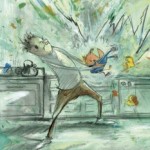Published: December 17, 2009
 Are you a verbal learner or a visual learner? Chances are, you’ve pegged yourself or your children as either one or the other and rely on study techniques that suit your individual learning needs. And you’re not alone— for more than 30 years, the notion that teaching methods should match a student’s particular learning style has exerted a powerful influence on education. The long-standing popularity of the learning styles movement has in turn created a thriving commercial market amongst researchers, educators, and the general public.
Are you a verbal learner or a visual learner? Chances are, you’ve pegged yourself or your children as either one or the other and rely on study techniques that suit your individual learning needs. And you’re not alone— for more than 30 years, the notion that teaching methods should match a student’s particular learning style has exerted a powerful influence on education. The long-standing popularity of the learning styles movement has in turn created a thriving commercial market amongst researchers, educators, and the general public.
The wide appeal of the idea that some students will learn better when material is presented visually and that others will learn better when the material is presented verbally, or even in some other way, is evident in the vast number of learning-style tests and teaching guides available for purchase and used in schools. But does scientific research really support the existence of different learning styles, or the hypothesis that people learn better when taught in a way that matches their own unique style?
Unfortunately, the answer is no, according to a major new report published this month in Psychological Science in the Public Interest, [continue reading…]
Published: November 13, 2009
 A new study has found that young people feel differently about two types of parental control, generally viewing a type of control that’s thought to be better for their development more positively. However, when parents are very controlling, young people no longer make this distinction and view both types of parental control negatively. The study, conducted in the United States by researchers at Örebro University in Sweden, appears in the November/December 2009 issue of the journal Child Development. Unlike a lot of prior research on parenting that’s focused on control, this study looked at how adolescents view and react to parental control. [continue reading…]
A new study has found that young people feel differently about two types of parental control, generally viewing a type of control that’s thought to be better for their development more positively. However, when parents are very controlling, young people no longer make this distinction and view both types of parental control negatively. The study, conducted in the United States by researchers at Örebro University in Sweden, appears in the November/December 2009 issue of the journal Child Development. Unlike a lot of prior research on parenting that’s focused on control, this study looked at how adolescents view and react to parental control. [continue reading…]
Published: October 17, 2009
 This week in the New Yorker Magazine, Rebecca Mead writes about Alloy Entertainment, which produces best-selling books for teens and tweens, and Daniel Zalewski writes about parent-child dynamics in picture books. Here Zalewski and Mead talk with Blake Eskin about how these books represent parents, what they read as children, and the difference between “Gossip Girl” and “The House of Mirth.”
This week in the New Yorker Magazine, Rebecca Mead writes about Alloy Entertainment, which produces best-selling books for teens and tweens, and Daniel Zalewski writes about parent-child dynamics in picture books. Here Zalewski and Mead talk with Blake Eskin about how these books represent parents, what they read as children, and the difference between “Gossip Girl” and “The House of Mirth.”
link to download audio
Source: The New Yorker
Published: September 23, 2009

Image:stockxpert
arents say that honesty is the best policy but they regularly lie to their children as a way of influencing their behaviour and emotions, finds new research from the
University of Toronto and the
University of California, San Diego.
In one of the studies, many parents reported they told their young children that bad things would happen if they didn’t go to bed or eat what they were supposed to. For example, one mother said she told her child that if he didn’t finish all of his food he would get pimples all over his face. Other parents reported inventing magical creatures. One explained, “We told our daughter that if she wrapped up all her pacifiers like gifts, the ‘paci-fairy’ would come and give them to children who needed them. I thought it was healthier to get rid of the pacifiers and it was a way for her to feel proud and special.” [continue reading…]
 Are you a verbal learner or a visual learner? Chances are, you’ve pegged yourself or your children as either one or the other and rely on study techniques that suit your individual learning needs. And you’re not alone— for more than 30 years, the notion that teaching methods should match a student’s particular learning style has exerted a powerful influence on education. The long-standing popularity of the learning styles movement has in turn created a thriving commercial market amongst researchers, educators, and the general public.
Are you a verbal learner or a visual learner? Chances are, you’ve pegged yourself or your children as either one or the other and rely on study techniques that suit your individual learning needs. And you’re not alone— for more than 30 years, the notion that teaching methods should match a student’s particular learning style has exerted a powerful influence on education. The long-standing popularity of the learning styles movement has in turn created a thriving commercial market amongst researchers, educators, and the general public.
 T
T

